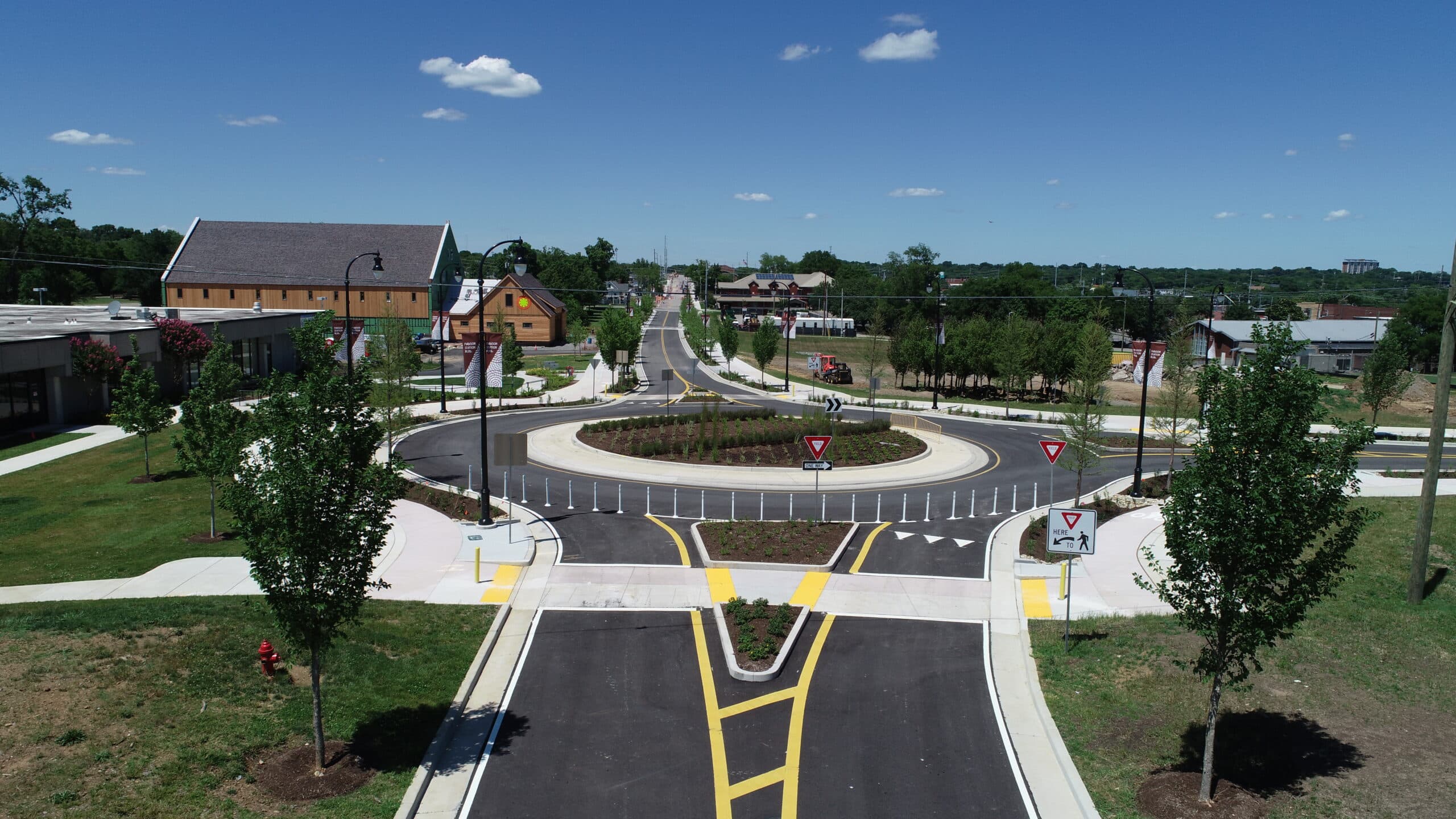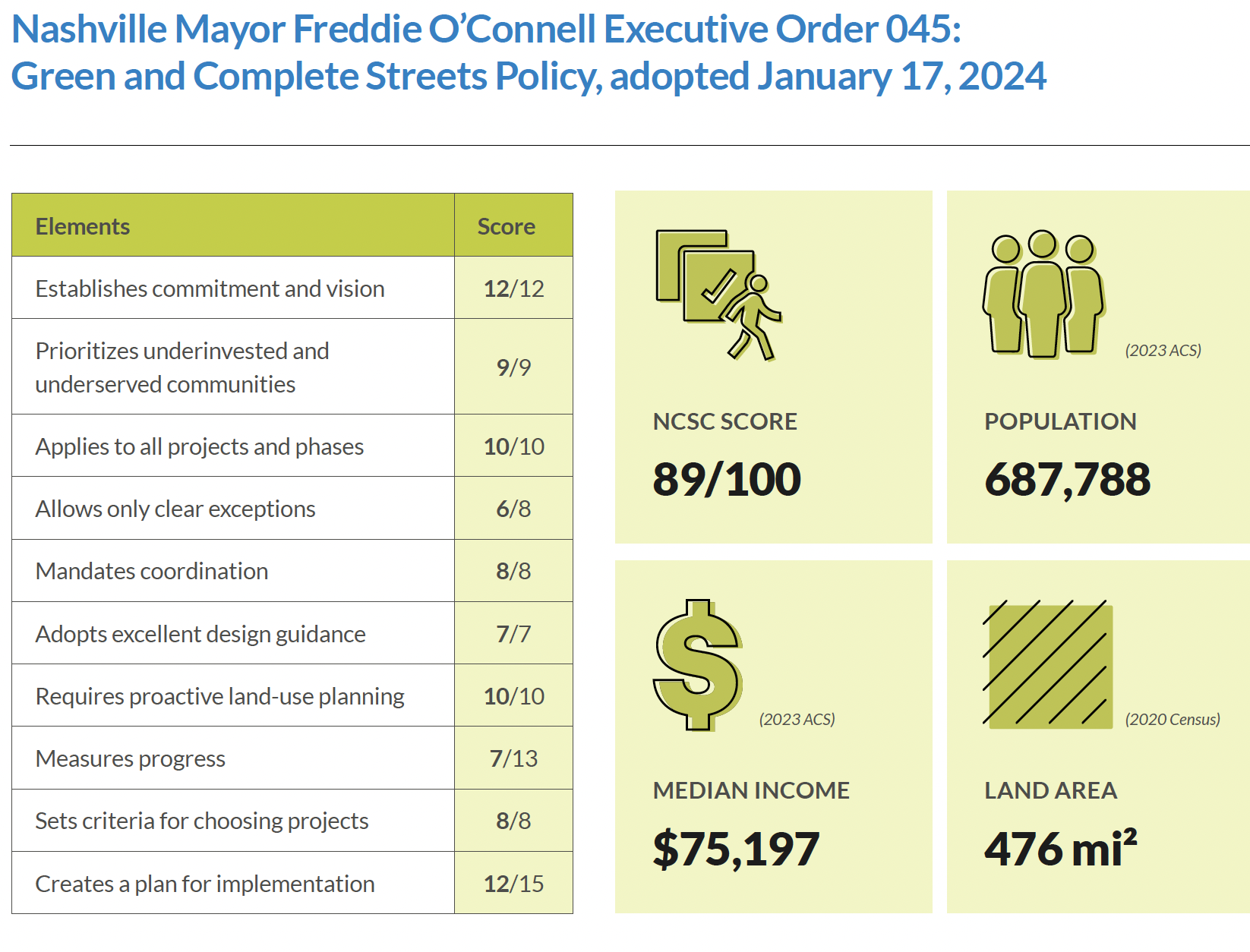
News
By Courtney Cole, June 25, 2025
Nashville has passed multiple Complete Streets policies over the past fifteen years, improving them with each iteration. The Complete Streets policy passed by the city in 2024 is a testament to their efforts and could bolster the city’s progress in the years to come. Nashville shows how cities already making strides on Complete Streets can take their efforts further by refining and updating their policies.
Read the full report here.
Part 1: Background
Nashville has had the goal of creating safer streets for years, but their case shows the importance of persistence and continual improvement. Nashville’s first Complete Streets policy was adopted in 2010, which was then amended in 2016. While these earlier policies had room for improvement, Nashville used them to demonstrate its commitment and vision to changing the status quo. In addition to creating foundational documents that support safe streets, Nashville has worked to create tangible improvements. For example, in 2022-2023 Nashville participated in Smart Growth America’s Complete Streets Leadership Academy, where they implemented safety interventions on state-owned routes. They have also recently passed a new transit referendum to fund continued street design changes.
When the new mayor came into office in January 2024, he wanted to put his own stamp on the city’s transportation future. Nashville’s New Complete Streets policy passed relatively quickly and built on the policies, design changes, and efforts that took place before it took effect on January 17, 2024. This new policy embodies a strong commitment to Complete Streets and addresses some areas that previous policies lacked.
Part 2: Road to adoption
Nashville’s current Mayor, Freddie O’Connell is a champion for Complete Streets and has supported improved transportation throughout his career, including serving on the board for Nashville’s Metropolitan Transit Authority. It was not a surprise when he confirmed this commitment with an updated Complete Streets policy just a few months after taking office.
Since it came in the form of an Executive Order, the Complete Streets policy did not require significant political negotiations or a council vote. However, passing the policy so quickly presented challenges since the administration had to review previous policies and other materials to make sure the new policy aligned with the city’s master plan. This was especially demanding since it took place during the early days of the new administration, a time when there are numerous competing priorities. The administration also had to balance the need for including precise and strong policy language with the goal of moving quickly and beginning working on Complete Streets as fast as possible.
By the time the 2024 Complete Streets policy was created, Nashville had some implementation experience under its belt in the form of both permanent and quick-build projects. This helped identify what types of tools would be helpful for improving the implementation process, which were embedded in the Complete Streets policy and the subsequent Complete Streets Implementation Guide adopted later that year.
Part 3: What makes this policy great
Nashville’s new policy effectively lays out project selection criteria and incorporates community data within that process—prioritizing underinvested communities and areas that have high rates of fatalities and injuries.
In recent years, Nashville has seen a significant increase in the rate of pedestrian fatalities. And evidence suggests that fatalities and injuries disproportionately affect underinvested communities in Nashville. For example, African Americans make up about 25% of the population of Nashville, but account for over 35% of pedestrian deaths and serious injuries in the last 5 years. Incorporating community data into project selection will help ensure that Nashville’s efforts reach the areas of highest need.
“To facilitate this, NDOT shall develop a project prioritization tool based on a point system to prioritize projects that improve safety and increase multimodal level of service for the most vulnerable communities.” Nashville Mayor Freddie O’Connell Executive Order 045: Green and Complete Streets Policy
Using strong, binding language regarding vulnerable and underserved communities rather than vague and suggestive language also makes Nashville’s policy stand out. And laying out specific steps for how that prioritization will happen, including using data to develop an informed community engagement plan, makes the policy much more likely to have an impact.
Nashville’s policy provides guidance for effective implementation. This characteristic makes it a valuable tool for making tangible changes within the community. In particular, their commitment to providing training for transportation staff and addressing barriers to community engagement set this policy apart. The accompanying implementation guide provides additional support and guidance.
“We really wanted to make sure that there was practical and direct language, so it would be a tool for us to craft policies around successful implementation.” — Justin Cole, Transportation Planner Nashville Department of Transportation and Multimodal Infrastructure
Part 4: Putting the policy into practice
Nashville’s new and improved policy is another important step on its path to safer streets and healthier communities. It reaffirms some of the practices and procedures the city was following and adds some essential new elements.
For example, the new project selection criteria means that projects that feature the Complete Streets approach are more likely to receive funding and support. Additionally, the “project life cycle” tool in Nashville’s Complete Streets Implementation Guide, which was developed to support the policy, has allowed them to ensure Complete Streets considerations and principles are implemented from the start of a project rather than added as an afterthought.
The city has also identified some obstacles and is working to address them, such as updating engineering standards to reflect its commitment to Complete Streets. They’ve also recognized that the same approach does not work on every street, and are working to develop specific street typologies so that the characteristics of the existing infrastructure are considered within the Complete Streets approach. The city also partnered with Smart Growth America to host a webinar series about Complete Streets implementation for city staff, other relevant stakeholders, and the general public.
Nashville’s Complete Streets efforts will receive a major boost from its Choose How You Move program. Funded by a new sales tax approved by voters in November 2024, this will support the installation of over 80 miles of sidewalks, over 50 miles of all-access corridors, updated signals at nearly 600 intersections, and the implementation of Complete Streets projects along approximately 40 miles of roadway.
“We wanted to get away from the idea of a complete street as a thing, but as an approach, so that every decision that we make, no matter how small or large, is consistent with that approach.” — Justin Cole, Transportation Planner, Nashville Department of Transportation and Multimodal Infrastructure
Part 5: Lessons learned
Build on your foundations and continually improve. Nashville’s new Complete Streets policy did not emerge from a vacuum. Instead, it was based on the previous policies and aligned with other complementary efforts such as Vision Zero. However, the new policy addressed important gaps that were missing or weak in earlier policies. Complete Streets policies are not a one-time action. Instead, jurisdictions should constantly seek to refine and improve them based on progress and impacts.
Action-oriented words speak louder. Nashville recognized the need to use their policy not only as a proclamation of a commitment to Complete Streets policy but as a tool for implementation. Focusing on practical language that requires practitioners to create processes and standards leads to policies that move from the page into practice.
Give yourself tangible tools for success. Nashville realized that they needed standards, procedures, and guidelines so that Complete Streets are implemented as a process rather than an attribute of a single project. As a crucial first step, they created their Complete Streets Implementation Guide in tandem with their Complete Streets policy.
Thank you to Justin Cole, Transportation Planner at the Nashville Department of Transportation and Multimodal Infrastructure, for his time and expertise in producing this case study.
Related News

© 2026 Smart Growth America. All rights reserved
Site By3Lane Marketing











